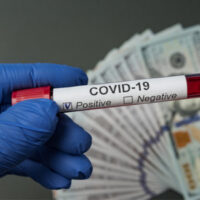Preventing & Defending Against Federal COVID-19 Fraud Charges as A Result of PPP Loan Applications

There have been a number of recent arrests and fraud charges in connection with the Small Business Administration’s (SBA) Paycheck Protection Program (PPP), including here in Florida, resulting in authorities seizing property and millions from bank accounts. The program was created by the federal CARES Act to help small business owners obtain forgivable loans in order to keep employees on the payroll, as well as cover certain other expenses, such as utilities.
However, applying for a loan within the program can open anyone up to certain federal criminal risks, as federal prosecutors, the Department of Justice, and coronavirus fraud coordinators are now preparing to determine to what extent applicants made any false statements on their applications and/or engaged in any fraudulent conduct in connection with the program. As a result, if you are submitting an application, it is important to consult legal counsel in order to ensure that you are aware of the numerous legal pitfalls and repercussions.
Penalties
The PPP program lists a number of penalties in conjunction with the act of knowingly making a false statement to obtain a loan, which is somewhat confusing, and includes the following:
- Five years’ imprisonment and/or $250,000 fine: For making false statements
- Two years’ imprisonment and/or a $5,000 fine: For making false statements to the SBA
- 30 years’ imprisonment and/or a $1,000,000 fine: If submitted to a federally-insured institution, such as a bank
- 20 years’ imprisonment and a $250,000 fine: For wire fraud and mail fraud
- 30 years’ imprisonment and a $250,000 fine: For bank fraud
What the government is indicating is that it can, by its own discretion, charge you under any of these listed circumstances.
Areas of The Application That Most Frequently Lead to Errors
Of those applicants that the government has chosen to investigate and/or prosecute, they have most frequently taken issue with the following information provided on their applications:
- Company ownership: The identity of anyone who owns 20 percent or more equity in the company must be disclosed
- Location: If the business is located in a foreign country, it does not qualify
- Criminal history: Certain criminal convictions for any owners disqualifies them from applying
- Eligibility under Section 3 of the Small Business Act: This includes the total number of employees, how they are classified, etc. Also note that total employees on application form includes those who have worked temporarily, part-time, etc.
- Certification section: Applicants must certify that the loan request is necessary in order to support their ongoing operations, necessitating that due diligence be done in order to ensure that this is not signed off on potentially fraudulently
If You Are Facing Charges or Have Questions About COVID-19 Relief Fraud/Federal Charges, Contact Florida Criminal Defense Attorney Jose Baez
If the application ends up containing any errors, working with counsel will help applicants to fall back on being able to put forth a good faith defense to justify these errors. If you have any questions about federal and/or white collar crimes, contact the Orlando criminal lawyers at The Baez Law Firm today to find out how we can be of service.
Resource:
justice.gov/opa/pr/florida-man-who-used-covid-relief-funds-purchase-lamborghini-sports-car-charged-miami-federal
https://www.baezlawfirm.com/judge-blocks-federal-execution-due-to-covid-19-concerns/




















